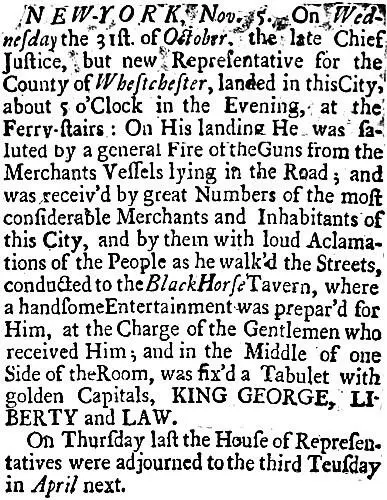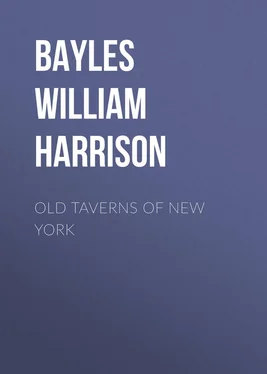William Bayles - Old Taverns of New York
Здесь есть возможность читать онлайн «William Bayles - Old Taverns of New York» — ознакомительный отрывок электронной книги совершенно бесплатно, а после прочтения отрывка купить полную версию. В некоторых случаях можно слушать аудио, скачать через торрент в формате fb2 и присутствует краткое содержание. Жанр: foreign_antique, foreign_prose, на английском языке. Описание произведения, (предисловие) а так же отзывы посетителей доступны на портале библиотеки ЛибКат.
- Название:Old Taverns of New York
- Автор:
- Жанр:
- Год:неизвестен
- ISBN:нет данных
- Рейтинг книги:3 / 5. Голосов: 1
-
Избранное:Добавить в избранное
- Отзывы:
-
Ваша оценка:
- 60
- 1
- 2
- 3
- 4
- 5
Old Taverns of New York: краткое содержание, описание и аннотация
Предлагаем к чтению аннотацию, описание, краткое содержание или предисловие (зависит от того, что написал сам автор книги «Old Taverns of New York»). Если вы не нашли необходимую информацию о книге — напишите в комментариях, мы постараемся отыскать её.
Old Taverns of New York — читать онлайн ознакомительный отрывок
Ниже представлен текст книги, разбитый по страницам. Система сохранения места последней прочитанной страницы, позволяет с удобством читать онлайн бесплатно книгу «Old Taverns of New York», без необходимости каждый раз заново искать на чём Вы остановились. Поставьте закладку, и сможете в любой момент перейти на страницу, на которой закончили чтение.
Интервал:
Закладка:
About an hour after this the high sheriff came to town, finely mounted, with housings and holster caps of scarlet, richly laced with silver. Upon his appearance the electors on both sides went into the Green. After reading his majesty’s writ the sheriff directed the electors to proceed to their choice, which they then did, a great majority appearing for Morris. A poll was demanded and the sheriff insisted that a poll must be taken. A poll was taken, and did not close until about eleven o’clock at night. Morris, although the votes cast for him by thirty-eight Quakers were rejected, because they would not take the oath, was elected by a large majority.
The indentures being sealed, the whole body of electors waited on the new representative, at his lodgings, with trumpets sounding and violins playing and then took leave of him.
The foregoing follows the account which appeared in the New York Weekly Journal, which was friendly to Morris. In the same number of this paper the only item of local news is the following, which we reproduce in fac-simile.

Thus the Black Horse Tavern had become the rallying place and rendezvous for the party of the people, and was, from this time, we have every reason to believe, the place where they continued to meet to concert on measures against prerogative and favoritism and against the arrogance and arbitrary acts of the governor and his supporters. These sentiments were not new to the people, but had been lying dormant, like smoldering embers, which needed only a slight agitation to fan them into a flame. Not since the time of Bellomont had there been so much bitterness displayed in party strife.
Since 1725, a newspaper had been printed in New York, but William Bradford, its printer, was in the pay of the government, and no item in opposition to the governor or his friends was to be found in its pages. In November, 1733, appeared the first number of the New York Weekly Journal, printed by John Peter Zenger, and devoted to the support of the party of the people, at the head of which were Lewis Morris and Rip Van Dam. It soon began to make itself felt. It was eagerly read, its sarcastic, reflections on the government, and its biting criticisms, furnishing a weekly entertainment to the public, which drove the governor and his friends almost to madness. Its effect was so keenly felt that it was resolved, in council, that Zenger’s papers, Nos. 7, 47, 48 and 49, and also two certain printed ballads, as containing many things tending to sedition and faction, to bring his majesty’s government into contempt, and to disturb the peace thereof, should be burned by the common hangman or whipper, and that the mayor and magistrates should attend the ceremony. This they refused to do and forbade the whipper, who was in the employ of the city, to obey the order. His place was supplied by a negro slave of the sheriff. Attempts were made to have Zenger indicted, but the grand jury refused to bring in a bill.
In November, 1734, Zenger was arrested and imprisoned, by order of the council, for printing seditious libels, and, for a time, was denied the use of pen, ink and paper. In January, 1735, the grand jury not having indicted him, the attorney-general filed an information against him. In the meantime he was editing his paper through a hole in the door of his cell. At the April term of court his counsel, James Alexander and William Smith, the two ablest lawyers of New York, filed exceptions to the legality of the commissions of the two judges. For this they were silenced, and John Chambers was appointed by the court counsel for Zenger
When the trial came on, in July, 1735, Andrew Hamilton, of Philadelphia, a lawyer of great reputation, who had been secretly engaged, unexpectedly appeared by the side of the prisoner. He was capable, eloquent and audacious, and, in conjunction with Chambers, managed the case with so much ability and skill that the jury, after being out only ten minutes, returned with a verdict of Not Guilty , which was received with shouts and cheers. The judges threatened the leaders of the tumult with imprisonment, when a son of Admiral Norris, who was also a son-in-law of Lewis Morris, declared himself the leader and invited a repetition of the cheers, which were instantly repeated. Andrew Hamilton was hailed as the champion of liberty. The corporation of New York shortly presented him with the freedom of the city in a gold box, “for his learned and generous defence of the rights of mankind and the liberty of the press.” Zenger was released from prison, after having been confined for more than eight months. After the trial was concluded, the enthusiasm and demonstrations of satisfaction centered at the Black Horse Tavern, where a splendid dinner was given to Andrew Hamilton in celebration of his great victory. At his departure, next day, “he was saluted with the great Guns of several Ships in the Harbour as a public Testimony of the glorious Defence he made in the Cause of Liberty in this Province.” Governeur Morris stated to Dr. John W. Francis his belief that “the trial of Zenger, in 1735, was the germ of American freedom – the morning star of that liberty which subsequently revolutionized America.” The Black Horse Tavern, therefore, if it was not the cradle of liberty, was certainly the nursery of those sentiments which ripened into the Declaration of Independence. No spot in New York is so closely identified with this victory for the rights of free speech and for the liberty of the press, as the site of the Black Horse Tavern, which is now occupied by an office building called Lord’s Court.
Lewis Morris at this time was in London, where he had gone to lay his grievances before the home government. His case came before the Committee of the Council in November, 1735, “when the Lords gave it as their opinion that the Governor’s Reasons for Removing him were not sufficient.” He was not, however, restored to the office of chief justice, but was appointed governor of New Jersey, where he had large interests, and where the people had long desired to have a government separate and distinct from New York.
Many writers have erroneously asserted that the Black Horse Tavern was the resort of the friends of the governor, where balls were given by the aristocratic members of society, and that Robert Todd was its landlord; but all that is necessary to clear up this mistake is to pay careful attention to the files of the two rival newspapers of that day, Bradford’s Gazette and Zenger’s Journal.
On Broad Street, near the corner of Dock Street (the present Pearl Street), Robert Todd, vintner, kept his house, which became, indeed, the favorite place for the balls and entertainments of the governor’s party, as was the Black Horse Tavern for the party of the people. On October 9, 1735, the governor was invited “to a very splendid entertainment provided for him at Mr. Todd’s in order to Congratulate his Excellency upon his safe Return from Albany, where he had been to renew the Treaty of Peace and Friendship with the Six Nations of Indians.” After dinner they drank the healths of the different members of the royal family and the health of his excellency and prosperity to his administration – “the music playing all the while.” “His Excellency was also pleased to Drink Prosperity to Trade, and at the same time, in a very obliging manner, assured the Gentlemen there, That if they could think of any Methods to Promote and Encourage the Trade and Welfare of this Province, he would heartily contribute every Thing in his Power thereto.” In the evening the house was illuminated.
Читать дальшеИнтервал:
Закладка:
Похожие книги на «Old Taverns of New York»
Представляем Вашему вниманию похожие книги на «Old Taverns of New York» списком для выбора. Мы отобрали схожую по названию и смыслу литературу в надежде предоставить читателям больше вариантов отыскать новые, интересные, ещё непрочитанные произведения.
Обсуждение, отзывы о книге «Old Taverns of New York» и просто собственные мнения читателей. Оставьте ваши комментарии, напишите, что Вы думаете о произведении, его смысле или главных героях. Укажите что конкретно понравилось, а что нет, и почему Вы так считаете.












